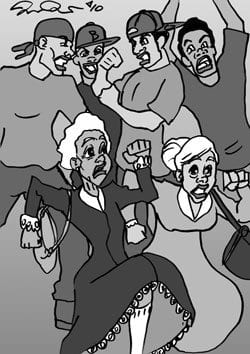
A need for street diplomacy
Sadly, violence is a natural aspect of life for many urban black youngsters. Their elders are mystified by the murders and the drive-by shootings. Life in major cities was not always so perilous.
Often when a “good kid” is gunned down, as opposed to a gang banger, the community stops to wonder once again whether the violence will ever end. Earlier this month 14-year-old Jaewon Martin was gunned down on a basketball court at the Bromley-Heath housing project in Jamaica Plain. Martin was an honor student at the James P. Timilty Middle School and was not involved with gangs.
Those close to Martin were struck with grief and others were left to ponder a strategy to bring such incidents to an end. Clearly, the approaches that have been tried are not working. The protest marches provide a way to expiate grief, but they do little to discourage the latent assassins. Political protests do not germinate effective public policies. Solutions are elusive.
When a wave of violence occurs, the immediate reaction is to find someone or some institution to blame — a scapegoat. In cities, the mayor is usually the first one to be pilloried. That approach would be reasonable only if there was a policy that would absolutely end teen-age violence, that the mayor has refused to implement. Alas, there is no such sure-fire policy.
The normal process is for solutions to follow an understanding of the causes of the problem. Who knows why black youth resort quickly to lethal violence? Some say it is the result of poverty. Others claim it is a consequence of racial discrimination. Still others assert it is the result of inferior public education. Most analysts agree that the dissolution of the black family is of great significance.
The fact is that no one really knows why black youth kill their perceived antagonists. Poverty is not the answer. Blacks were more impoverished 50 years ago, and they did not resort to such violence. Other poor groups in America today do not suffer from such self annihilation. Also, racial discrimination today is far less intense than it was 50 years ago.
However, some facts are well known. Guns are the weapons of choice; most violence occurs in the late afternoon or early evening; and street gangs are territorial. They claim a neighborhood as their own and will not tolerate the unauthorized incursions of outsiders.
Sometimes what appears to be a random act of violence could actually be a declaration of war. Martin was playing basketball on the Heath Street gang turf, with local acquiescence. A conflict between the Heath Street and the H Block gangs has been unresolved since the murder of Jahmol Norfleet, leader of H Block on Nov. 28, 2006. There have been other acts of violence between the two groups since then.
The problem with gang conflicts is that the combatants do not always have the facts right. Even if the Martin shooting had nothing to do with the H Block gang, it could be incorrectly interpreted by the Heath Street gang as an intolerable violation of their sovereignty. It is time for the authorities to act so that this conflict does not break out anew.
The Nation of Islam has had great success in resolving such disputes. It is time to call upon Minister Don Muhammad to put an end to this festering conflict.






